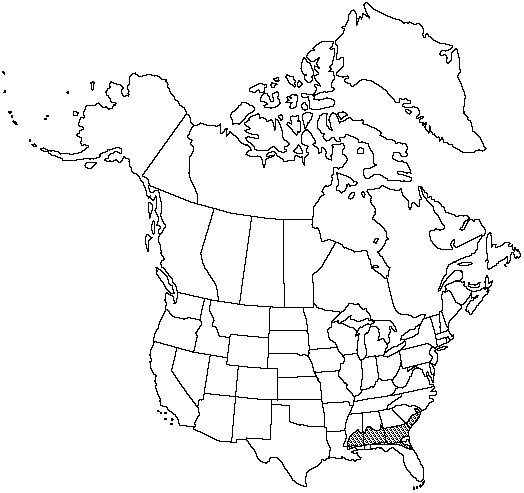Pinus glabra
Fl. Carol. 237. 1788.
Trees to 30m; trunk to 1m diam., straight; crown conic to rounded. Bark gray, fissured and cross-checked into elongate, irregular, scaly plates, resin pockets absent, on upper sections of trunk ± smooth, gray, looking slick. Branches whorled, spreading to ascending; twigs slender, purple-red to red-brown, occasionally glaucous, aging gray, smooth. Buds ovoid to ovoid-cylindric, red-brown, ca. 0.5–1cm, slightly resinous; scale margins finely fringed. Leaves 2 per fascicle, spreading to ascending, persisting 2–3 years, 4–8(–10)cm × 0.7–1.2mm, straight, slightly twisted, dark green, all surfaces with fine stomatal lines, margins finely serrulate, apex sharply conic; sheath 0.5–1cm, base persistent. Pollen cones lance-cylindric, 10–15mm, purple-brown. Seed cones maturing in 2 years, shedding seeds soon thereafter, semipersistent, spreading to recurved, nearly symmetric, lance-ovoid before opening, ovoid-cylindric when open, 3.5–7cm, red-brown, aging gray, nearly sessile or on stalks to 1cm, scales lacking contrasting border on adaxial surfaces (as in P. echinata); apophyses but slightly thickened and raised; umbo central, depressed, unarmed or with small, curved, weak, deciduous, short-incurved prickle. Seeds deltoid-obovoid; body ca. 6mm, brown, mottled darker; wing to ca. 12mm. 2n =24.
Habitat: Sandy alluvium and mesic woodland
Elevation: 0–150m
Distribution

Ala., Fla., Ga., La., Miss., S.C.
Discussion
Pinus glabra is more shade tolerant than most yellow pines. Although the trees grow large, the wood is not much valued. The species is similar in tree form to P. strobus. It resembles P. echinata in shoot and leaf but has less prickly cones and deeper green leaves.
Selected References
None.